
Your email marketing strategy should start with setting measurable and attainable goals. After all, when you have clear objectives and targets to aim for, it can make it easier for you to stay motivated. And with preparation, you can execute a game plan to get the list growth, engagement rates, and business results you’re looking for.
To help you get started, here are five email marketing campaign goals to help you achieve success starting today:
Grow your email subscriber list
Improve email click-through rates
Retain current customers
Reduce unsubscribes
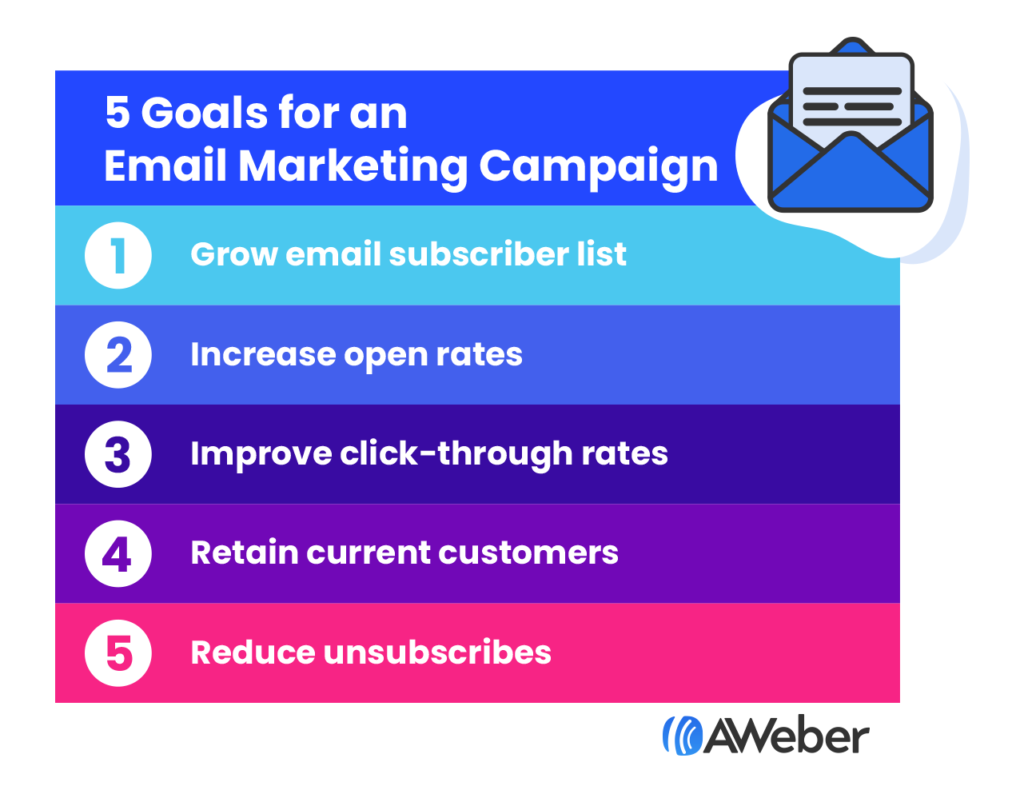
1. Grow your subscriber list
As an email marketer, your subscribers are your most valuable asset. That means in order to run a successful email marketing campaign, you need to build and maintain a list of people who regularly open, read, and engage with your messages.
Even if you have a healthy list of contacts, continuing to gain subscribers is critical to maintaining an engaged audience – after all, the average email marketing list decreases by around 22.5% every year.
[bctt tweet="Even if you have a healthy email list, gaining new subscribers is critical for an engaged audience."]So if your marketing efforts aren’t increasing your email list by over 22.5% a year, you’ll slowly watch as your subscribers shrink.
If you’re hoping to grow your subscribers, there are a couple of email marketing objectives you should keep in mind.
Make it easy for people to subscribe to your emails
Where does your audience interact with your company the most – on your blog, website, social networks, etc.? You can collect more new contacts with a sign up form on the platforms where your company is already the most visible.
Furthermore, consider how you can optimize the positioning of your form on these pages. More people will see your form and sign up if you place your sign up form at the top of your homepage or in a pop up / slide-in form.
Take AWeber for example, we have our Newsletter signup at the top of every blog post, where we encourage readers to get the latest weekly tips.
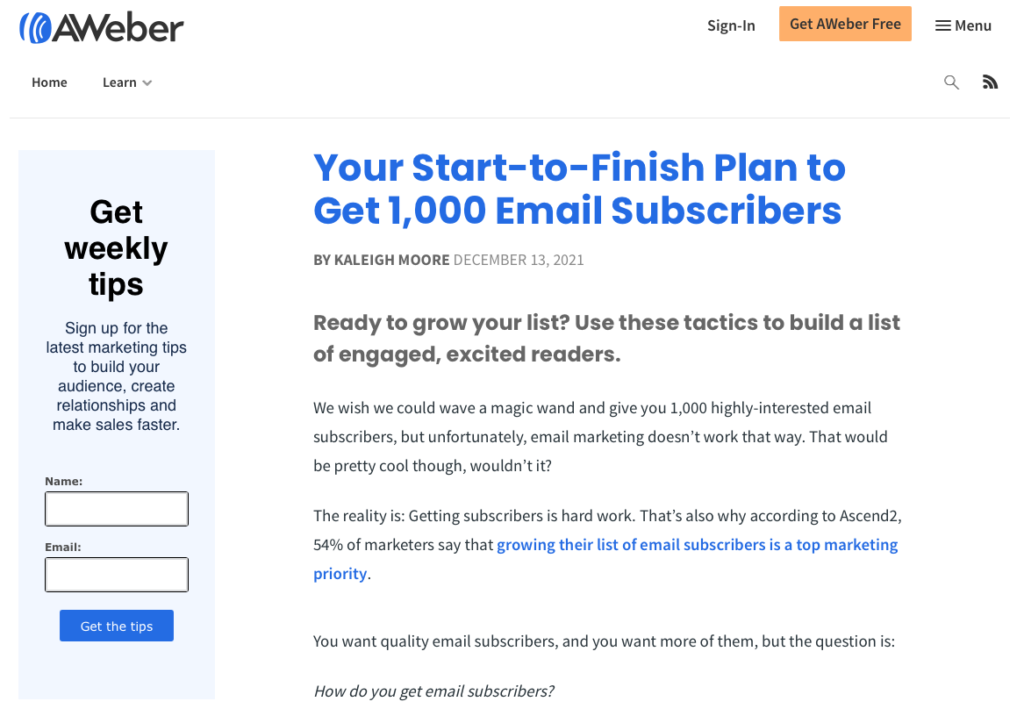
Include valuable reasons to subscribe in your sign up form
Most people are protective about their personal information and require a compelling reason to give you their email address; it’s crucial that your audience understands the value of your emails from the get-go.
Want to show value? Here are a few ways:
- Explain what your audience will receive in your emails and how frequently they’ll get them.
- Add positive feedback (social proof) from current subscribers.
- Advertise a freebee, promo code, or other lead magnet in your sign up form and make sure it goes out automatically in your first welcome email.
This way, you can connect with the right people and set a foundation based on trust when you send them valuable emails straight away.
Setting expectations on your form also helps prevent any unpleasant surprises, which could motivate your subscribers to mark your emails as spam if you send them something they didn’t expect.
Check out this sign up form below, which visitors will find on DigitalMarketer’s homepage:
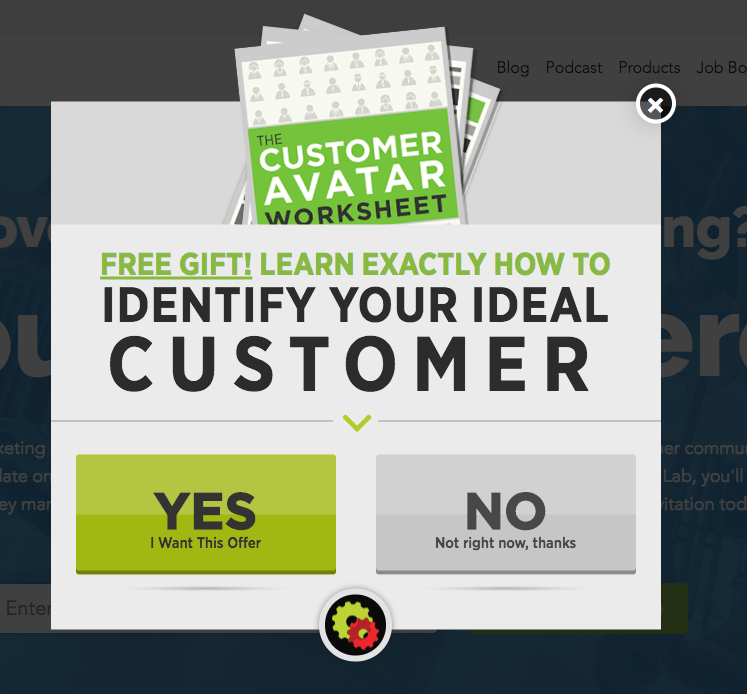
See how they advertise a free gift for signing up?
Plus, by using a delayed overlay opt-in form and large text, there’s no doubt viewers will understand the purpose of the form and the value they could potentially get for subscribing.
Plus, it makes it easier for people to either sign up or close the form if they’re not interested.
2. Increase your email open rates
Although the nature of open rate reporting has changed since the 2021 iOS update, continued high open rates are still a very important gauge of subscriber interest in your emails. I.e., are people actually opening the emails you send?
The more people open your emails, the more opportunities you’ll have to turn them into loyal customers or advocates of your brand. And you won’t make many sales via email if no one opens your emails.
To improve your open rates, you need to stand out in overcrowded inboxes.
[bctt tweet="The more people open your emails, the more chances you’ll have to turn them into loyal customers."]Here are two things to keep in mind when planning your next email send.
Spend extra time writing your subject line
The subject line of your email can make or break your open rate, especially when you consider that the average person receives over 100 emails per day.
To get your subject line to stand out, keep it short and concise. Also, opt for direct, actionable language. How can you capture your readers’ attention and entice them to open your email? With a compelling, persuasive subject line.
Try creating a sense of urgency in your subject lines to motivate subscribers to read more. Include phrases like “limited-time only,” “hurry,” and “last chance” to create a sense of urgency. You can also reference specific details around how much time is left on an offer (like “25% off sale ends in 24 hours!”).
Here are a couple of examples of what it looks like:


You can also use personalization and emojis to help make your emails pop. Check out these subject lines:
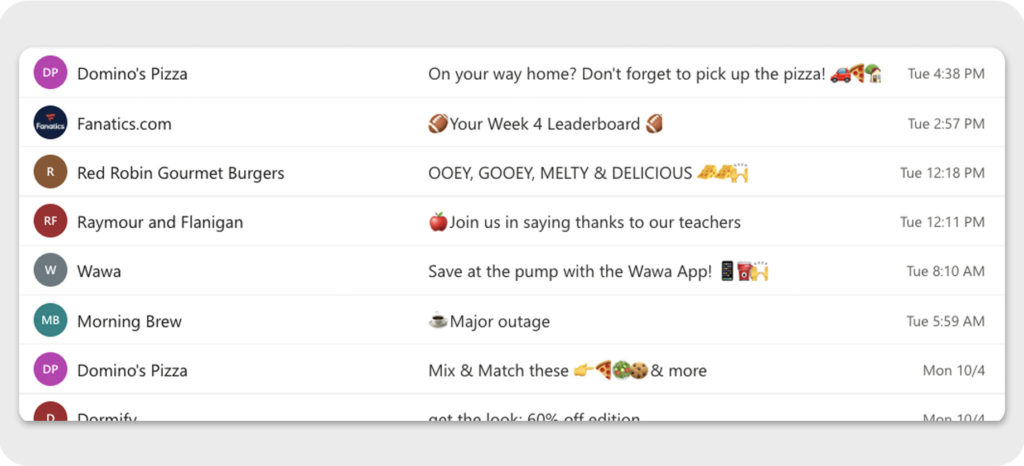
Use confirmed opt-in (also known as a double opt-in)
What’s the best way to ensure your subscribers are engaged? By getting permission from contacts before adding them to your list. After someone subscribes, send them an email asking them to confirm their subscription. Then you can send the lead magnet and welcome emails to only the most engaged subscribers.
Using confirmed opt-in also allows you to filter out potential subscribers who signed up to your list by accident or aren’t really that interested in your emails. But more importantly, it gives people an opportunity to validate that they definitely want to receive your emails.
Remember, the more people you have on your list who actually want to hear from you, the better your open and click-through rates will be.
Here’s a great example of a confirmed opt-in email from Stripo:
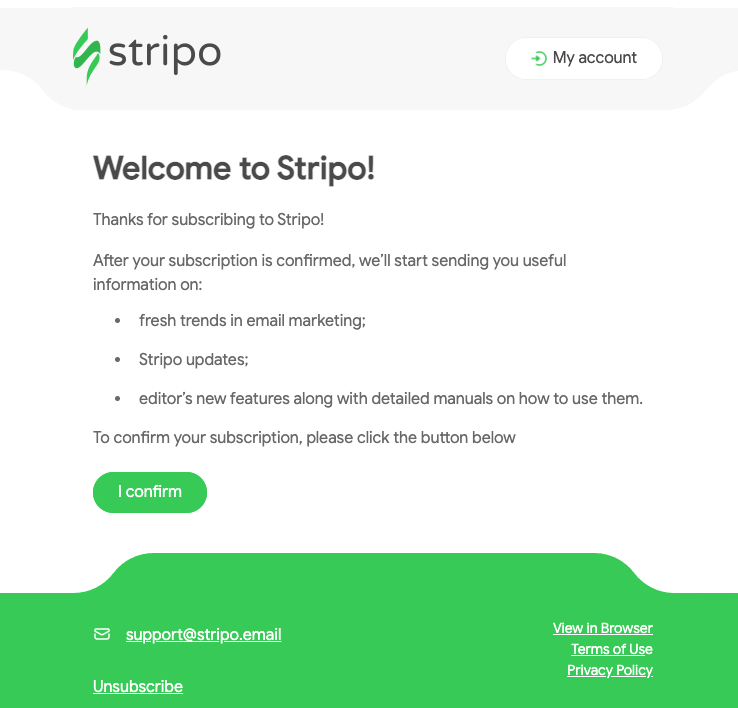
3. Improve email click-through rates
Click-through rates measure the number of subscribers who click on the links in your emails. They are one of the most effective ways to determine audience engagement.
High click-through rates are a good indicator of a strong relationship with your subscribers. And we all know better relationships result in longtime customers, word-of-mouth referrals, loyalty, and other opportunities to bring in more business.
If improving your click-through rates is on your to-do list, focus on these email essentials:
Always send relevant, valuable information
Any time your subscribers read an email, they will always ask themselves, “What’s in it for me?”
Keep this in mind whenever you prepare an email to send to your audience. If you can clearly identify what subscribers will get out of the email (whether it’s education, an exclusive offer, etc.), then it passes the test.
Another way to improve engagement is by segmenting your subscribers into like-minded groups and sending relevant, targeted messages tailored to their specific needs and interests.
Include a clear call-to-action
Every email you send to subscribers should include a single call-to-action (CTA) that stands out and visually pops — whether it’s downloading an ebook, reading a blog post, or scheduling a free consultation.
Each CTA should offer something valuable to subscribers and stand out from the rest of your email. Experiment with its placement, wording and design to determine what kind of CTA creates a higher click-through rate.
In this email below, Candace Payne makes it extremely easy for new subscribers to download the incentive offered on her sign up form:
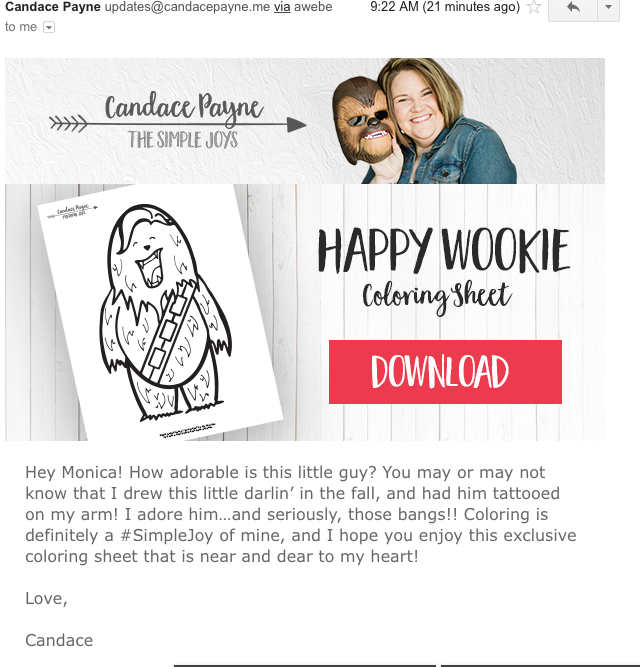
With only one CTA that is offered right at the top of the email, it's easy to take action as soon as the email is opened.
4. Retain current customers
One of the benefits of email marketing is that it engages new and existing customers — long after the sale is made.
Customer retention is crucial to the success of any business. Emails have the unique ability to build relationships with past customers, prompting them to purchase from you again in the future.
To boost engagement among your existing customers, here are some tactics to consider:
Send exclusive content and targeted offers
While it’s important to nurture leads before a purchase, it’s critical to maintain relationships with them now that they’ve become customers. This can help establish a relationship that is based on trust, appreciation, and authenticity.
One of the best ways to do this is to offer exclusive sales and discounts, courses, ebooks, and other content based on their interests.
Segmenting customers in this way can help you send targeted content to people who want it most. Not only does this encourage customers to make another purchase, but it also demonstrates your vested interest in their relationship with your business.
Consider sending emails based on past email engagement (if they clicked a link for a specific product, they may be interested in more content related to that topic), interests or geographical location.
Feature user-generated content and customer testimonials
Highlighting customers by sharing feedback or social posts about their experiences with your brand can go a long way in showing them you value their support.
[bctt tweet="Featuring customer feedback about their experiences with your brand shows them you value their support."]This also incentivizes other customers to follow suit and share their own experiences, in the hopes of getting recognition from your business.
5. Reduce unsubscribes
If you’re following email marketing best practices then this email campaign goal may not apply to you. Every business has unsubscribes, in fact having people unsubscribe from your list is actually a good thing. Why would you want to continue sending an email to someone who clearly has no interest in engaging with your content?
So when is this goal relevant?
An unsubscribe rate below 0.5 percent is within an acceptable range. If you consistently have a rate higher than 0.5 percent, it should create a plan to correct it.
Consider these tactics to reduce your unsubscribe rate:
Use confirmed opt-in
Just as confirmed opt-in can help improve your email open rates, it can also decrease your unsubscribe rate. As we mentioned earlier, the purpose of a confirmed opt-in is to ensure that your subscribers want to receive your content.
With a confirmed opt-in, an email is sent immediately after a subscriber signs up for your email list. The email contains a call to action to confirm they would like to be included in your email list.
This confirmation will reduce the number of customers unsubscribing because they have taken that extra step to verify that they want your content.
Segment your list
You can segment your list by common interests, then send content or offers that are more relevant to a specific audience.
Another way to segment your list is by last activity date, meaning the last date someone opened or clicked on one of your email sends. Best practice is not to email anyone who hasn’t opened or clicked an email in the last 6 - 12 months. Look at your engagement data to determine when you should stop emailing subscribers.
The more you email subscribers who are not engaged, the higher your chance that they will unsubscribe or worse, mark you as spam.
Take your email marketing campaign to the next level
Setting email marketing campaign goals can help grow your email list, increase subscriber engagement and expand your business.
And by making these commitments, it makes it easier to identify what tactics you need to try or continue using throughout the year in order to crush your goals.
Get started today in your AWeber account.
The post Top 5 Goals for Your Email Marketing Campaign appeared first on AWeber.
from AWeber https://ift.tt/ISPcFsq
via IFTTT
No comments:
Post a Comment